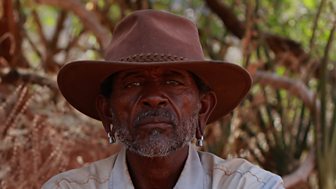Lemerigichen
Samburu tribesman Lemerigichen shows a British farmer how to rear cattle in unforgiving rural northern Kenya
| Fact title | Fact data |
|---|---|
| Age |
Think he's 50 but is not too sure as his birthdate isn't recorded
|
| Lives |
Mpagas village, at the foot of the Ndoto mountains, Kenya
|
| Family |
Two wives, two sons and four daughters by one, four children by the other
|
Lemerigichen is the proud owner of 80 cattle and a handful of goats. Like all Samburu, cattle are at the heart of Lemerigichen's life. Along with the help of his family, he runs his small holding like clockwork. Every week there's a regular routine of taking the cattle on a four hour walk to drink water from shallow wells and graze on the scarce pasture.
Lemerigichen wasn't always a cattle herder though. Unusually, when he was a young man he ventured far from his remote home to the bustling streets of Nairobi in search of a better future. The Samburu are known for their fearlessness, and are often employed as guards in the cities. Lemerigichen worked as a watchman for a year but decided, despite the hardships of life as a cattle herder, to return to carry on the tradition of cattle herding.
It's Samburu tradition to have more than one wife, and Lemerigichen married his first wife when he was a young man, and his six older children are teenagers. His second wife and younger children live a days walk away. A little school has opened there, and he is delighted that his children can go to school and learn to read and write.
His greatest fear is drought. Most of his herd was wiped out in 2011, and he is terrified that with changing weather patterns, the same will happen again. He worries for the future of the Samburu, and wants to make sure his children have other options when they are growing up.
He's a terrific dancer, and after the cattle are fed and watered, there's nothing Lemerigichen enjoys more than letting his hair down with the rest of the young men, with some traditional singing and dancing at the riverbed.




